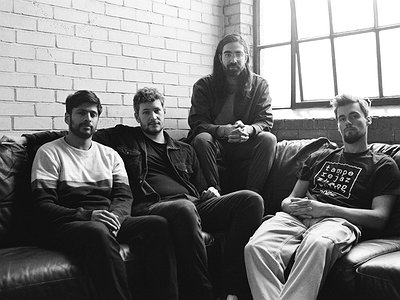Name: Twospeak
Members: Ronan Perrett (Saxophone), Mike De Souza (Guitar), Joseph Costi (Keyboards, synths), Ben Brown (Drums)
Interviewee: Ronan Perrett
Nationality: British
Occupation: Saxophonist, composer
Current Release: Twospeak's Fictions is out November 17th 2023 via None More.
If you enjoyed this Twospeak interview and would like to stay up to date on his music, visit his official homepage. He is also on Instagram, and Facebook.
Where does the impulse to create something come from for you? What role do often-quoted sources of inspiration like dreams, other forms of art, personal relationships, politics etc play?
For me being creative is a way to express myself and keep things feeling balanced. Like a river or a tap that needs to stay running for me to feel healthy and connected to the world around me and myself. I believe it’s a very natural and healthy part of being human to imagine and make new things out of what’s around us.
Other art forms played a foundational role in the making of Fictions - a main theme of the album is that the most impactful art can transcend its medium and each track on the record is based on and named after a piece of non-musical art.
And of course personal relationships, politics, what’s going on in your subconscious mind (and therefore dreams), all are part of what you bring to creating music.
For you to get started, do there need to be concrete ideas – or what some have called a 'visualisation' of the finished work? What does the balance between planning and chance look like for you?
Whilst writing Fictions I set out to capture the particular mood, feeling, character and story of eight pieces of non-musical art. I chose the artworks based on a quality to my response which I associate with the language of art, dreams and meaningful stories.
However I always try to stay intuitive and keep an open mind about how it plays out - I never think ‘this isn’t going the way I thought it would’ because I don’t have that thought in mind to begin with. It’s more like letting the music unfold in front of me as I make it, with a vague compass set towards the feeling I want to express and find in the music.
Is there a preparation phase for your process? Do you require your tools to be laid out in a particular way, for example, do you need to do 'research' or create 'early versions'?
The way for me to feel prepared is to feel in shape in two main creative areas - my improvising / composing intuition, which is strengthened by experience and use, and fluency with what I call my composing toolbox, which is a bunch of concepts and processes which provide the tools for generating, choosing and balancing the material for each composition in an aesthetically pleasing way which gets to the point of the song.
What do you start with? How difficult is that first line of text, the first note?
If you’re in shape making music you never really start and stop. However it’s easy to repeat yourself when you’re making music on a daily basis.
I found one successful way around this was to give myself a starting point far away from where I would usually begin. In this case the pieces of non-musical art which inspired the music on Fictions.
At the time I was studying a technique called cellular composition with the great drummer / composer John Hollenbeck, which provided a toolbox for creating the compositions out of a small amount of musical material generated directly from the artworks.
Once a piece is finished, how important is it for you to let it lie and evaluate it later on? How much improvement and refinement do you personally allow until you're satisfied with a piece? What does this process look like in practise?
For me, once it’s done it’s done - stand by it if you meant it at the time. If people like to listen to it and musicians like to play it I consider it more of a successful piece. It’s interesting to see which ones make it as it’s often not the ones you expect.
I usually try and finish a piece soon after starting so the point of it doesn’t change. If you let a composition rest it can become stale, or become a different piece to the one you set out to write.
There’s a fruit-like quality to gathering the material, letting it grow and be shaped by itself, then it being ready to pick and use before it falls.
What's your take on the role and importance of production, including mixing and mastering for you personally? How involved do you get in this?
It depends on the project - with Fictions and Twospeak in general, a lot of time goes into the mixing process after the tracks are recorded. Perhaps a day or more of mixing for each track.
We’re lucky to have had the amazing mixing engineer Alex Killpartrick onboard for all of the music the band has made so far. He's not phased by the complexity of the music, gets our sound and his musical personality melds in beautifully to bring a richness, depth and clarity to the music.
As bandleader I’m always present and involved in the mixing process, in this case in the recording process as well.




